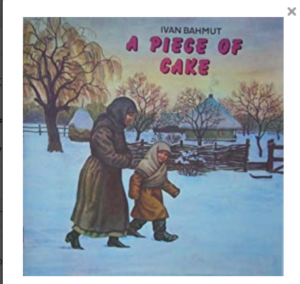
During the Diwali vacations this winter, I stumbled upon a long-lost treasure in my old library — a book I had cherished deeply as a child. It was the story my father used to read to me when I was tucked into bed, sprawled lazily on the drawing room sofa, or simply when I demanded.
A Ukrainian folk tale, the book remains one of my most vivid memories of storytime with my parents — a gem from childhood I will always hold dear.
Titled A Piece of Cake by Ivan Bahmut, the story unfolds in flashback and follows a little boy named Mikolko. He is thrilled to be invited to a dinner party at his aunt’s house — not only for the occasion, but also because he gets to wear his father’s shoes, as his own are torn. Before he leaves, his mother gently instructs him to behave like a gentleman and to eat modestly. She worries they might be ridiculed by his proud and arrogant Aunt Kalyan because of their poverty — a nuance the innocent Mikolko doesn’t quite understand.
Following his mother’s instructions, Mikolko exercises restraint during the dinner. When dessert — a cake — is finally served to the children, he politely accepts just one piece, and only after being urged. But the temptation is too great, and when he reaches for a second helping, both his mother and Aunt Kalyan catch him in the act.
To spare his mother the embarrassment, Mikolko quickly comes up with an excuse — he says he was only trying to feed the cake to the cat. Aunt Kalyan, aiming to mock him further, scoffs and asks how a cat could possibly eat cake. At that moment, her cheerful son playfully snatches the slice from Mikolko’s hand and feeds it to the cat — who devours it with great delight, much to everyone’s surprise.
Aunt Kalyan, now sullen-faced, openly displays her disdain, going so far as to call Mikolko’s father a thief. In contrast, Mikolko’s mother is overcome with tears — not of shame, but of pride and love, on the pleasurable discovery of his son’s mature understanding.
The mother’s fear of humiliation, rooted in poverty, is portrayed with remarkable sensitivity throughout the story — her vulnerability at the dinner table feels raw, tender, and painfully real. It’s a poignant glimpse into the emotional world of someone trying to preserve dignity in the face of judgment.
Though A Piece of Cake is listed on Goodreads, there is little literature available on either the story or its author, Ivan Bahmut — an unfortunate oversight. This simple yet powerful folk tale beautifully reveals how children often interpret complex emotions like embarrassment and pride not through direct experience, but by intuitively reading their parents’ unspoken cues. It’s a quiet reminder of the emotional intelligence children possess, and the silent bonds they share with those they love.
